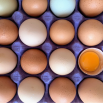As the USD prices take a different turn, the food prices can also take an upward turn, and thus certain steps need to be taken to ensure that the grocery bills remain within budget.
Generally, when you buy perfectly good food, some of it ends up in the garbage after you prematurely toss it due to confusing labels or thinking that it has been wasted.
"I think that the way some products are labeled it is unclear to the consumer what best before dates mean, when they should use the product, how they need to store it, etc.," said Phyllis Shand, professor of food science at the University of Saskatchewan.
"In Canada, the majority of our food products if they have a shelf life of less than 90 days are mandated to have a best before date," added Shand.
Thus, a product can be consumed even a day after the best before date which has been printed on the label. According to Shand, the best before dates indicate the quality of the food and not the safety.
The main concern for any consumer related to food safety is how the food is handled and stored. One can definitely buy as well as eat foods after the best before date, but it might not taste as well as before.
It may happen that the freshness of the food is lost or the flavor and the texture have changed. Additionally, the nutritional value of the food like Vitamin C might also be altered.
Hence, certain foods like milk can also be stored in the freezer and used even a week beyond the best before date. Eggs on the other hand can last a month but should be used in baking and not as a breakfast.
However, it must be noted that expiration dates are totally different from the best before dates and must not be confused. If a specific product has an expiration date mentioned, it should not be consumed after that.
© copyright 2024 Food World News, a property of HNGN Inc. All rights reserved. Use of this website constitutes acceptance of our terms and conditions of use and privacy policy.









